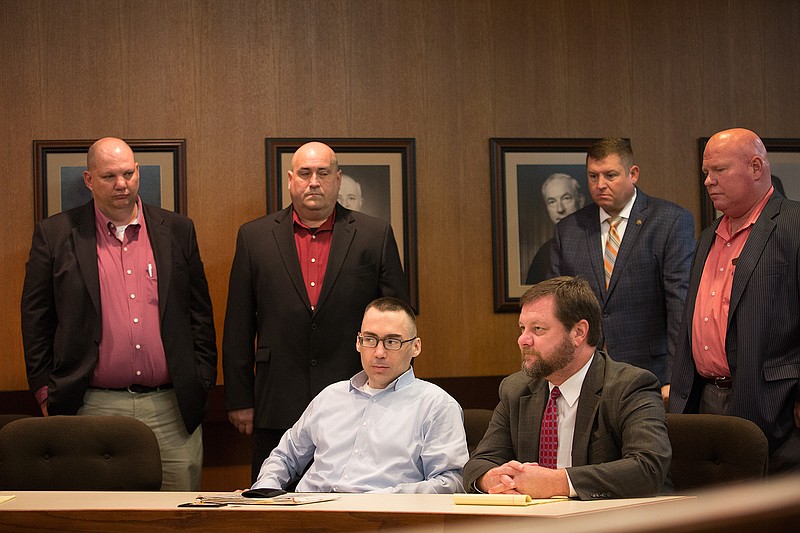A Texas prison inmate sentenced to death in November 2017 by a Bowie County jury in the beating death of a correctional officer is seeking a new trial.
Last week, Tracy's appellate lawyer, Jeff Haas of Tyler, filed the first appellate brief for the defense with the Texas Court of Criminal Appeals in Austin. The appeal asserts that the Texas death penalty violates the Texas and U.S. Constitutions, that Tracy should have been granted a change of venue, that Tracy should have been allowed "hybrid representation," and that there were problems with the jury.
Tracy, 40, was sentenced to death after a jury found him guilty of capital murder in the July 2015 beating death of Barry Telford Unit Correctional Officer Timothy Davison. Tracy attacked Davison, 47, as he opened the door to cell 66 and briefly turned his gaze. After knocking Davison to the floor, Tracy grabbed the officer's metal tray slot bar and wielded it like a hammer, striking Davison repeatedly in the head and face after he lost consciousness. Tracy took Davison's pepper spray before throwing him feet over head down the stairwell. As a group of Davison's fellow officers approached, Tracy fouled the air with the chemical agent and retreated to his cell. A member of the five-man extraction team that entered the cell to remove Tracy was bitten.
During the trial, Tracy's jury learned that he has been regularly violent from a young age. The jury heard of planned and calculated attacks on officers at Texas prisons across the state.
Tracy was serving two life sentences plus 20 years assessed by a Rockwall, Texas, jury in 1998 for an assault on a 16-year-old girl, an assault on a police officer and a residential burglary. Before he could be transferred from the Rockwall County jail to a Texas prison, Tracy nearly shot jailers there during an escape attempt.
In 2005, Tracy received multiple 45-year terms for repeatedly stabbing Correctional Officer Katie Stanley at the Clements Unit in Amarillo. After using a weapon fashioned from four razor blades to slash and permanently scar the face of Correctional Officer Brianlee Lomas in 2009 at the Robertson Unit in Abilene, Tracy received an additional 10-year term. In 2014, Tracy was caught trying to escape from the Hughes Unit in Gatesville, Texas, and was moved to the Telford Unit.
In advance of Tracy's trial, heavy steel metal bolts to which Tracy could be chained and restrained were installed beneath the defense table and in the witness box of the 102nd District courtroom at the Bowie County courthouse in New Boston, Texas. A cadre of officers from the Texas Department of Criminal Justice escorted Tracy and kept close watch of him during court hearings. At trial, the officers dressed in plain clothes so as not to give the jury an impression of how dangerous prison authorities estimate him to be.
As Tracy's case proceeded to trial, his lawyers, Mac Cobb of Mount Pleasant, Texas, and Jeff Harrelson of Texarkana, filed a bevy of pretrial motions in the case. Many of those challenged whether Texas death penalty statutes violate the U.S. Constitution. Those motions were denied at the pretrial level by retired 102nd District Judge Bobby Lockhart and reurged by Haas in the first appellate brief filed in the case.
Also filed by Cobb and Harrelson was a motion for the case to be moved to a different county. Haas argues that Lockhart's denial of the change of venue motion denied Tracy his right to a fair trial. The appellate brief complains that heavy pretrial publicity, talk of the case on social media and the regional economy's reliance on prisons as a source of employment made it impossible for Tracy to receive a fair shake in Bowie County.
There is no question that Tracy's case received print, online and television coverage. Lockhart tabled the motion at the trial level until after jury selection. Lockhart mentioned at pretrial hearings that if it appeared the pool of prospective jurors in Bowie County was tainted then he would consider moving the case to another jurisdiction. After seating a jury of 12 plus two alternates, Lockhart denied the motion at the end of Tracy's trial. The appellate brief notes that in addition to the approximately 700 people employed at Telford, there are four other correctional facilities in the area including a federal prison, two county jails and an Arkansas Community Corrections Center.
Tracy's brief argues that the trial court erred in denying him "hybrid representation." Tracy wanted to be able to file motions and make arguments in the case on his own behalf while being represented by his appointed lawyers at the same time. Tracy points to language in the Texas constitution which states that criminal defendants shall, "Have the right of being heard by himself or counsel or both."
At trial the state - represented by First Assistant District Attorney Kelley Crisp and Assistant District Attorney Lauren Richards - opposed hybrid representation as such would require prosecutors to respond not only to briefs and motions filed by Tracy's lawyers but by Tracy himself. Tracy filed dozens of pleadings in the case complaining about his lawyers, Lockhart, the prosecution and more.
Lockhart relied on precedent-setting Texas case law and denied the hybrid approach. Haas argues on appeal that Lockhart's denial of hybrid representation was error and that Tracy should get new trial because of it.
Now that Tracy has filed his first appellate brief, the state will prepare a response. Eventually the case could be argued orally before the Court of Criminal Appeals. If Tracy is denied post conviction relief by the Texas appellate court, he can appeal to the U.S. Supreme Court. Should the U.S. Supreme Court refuse to consider the case, Tracy could begin seeking relief in the federal court system.
For now Tracy is being held in Livingston, Texas, at the Polunsky Unit on Texas' death row.

